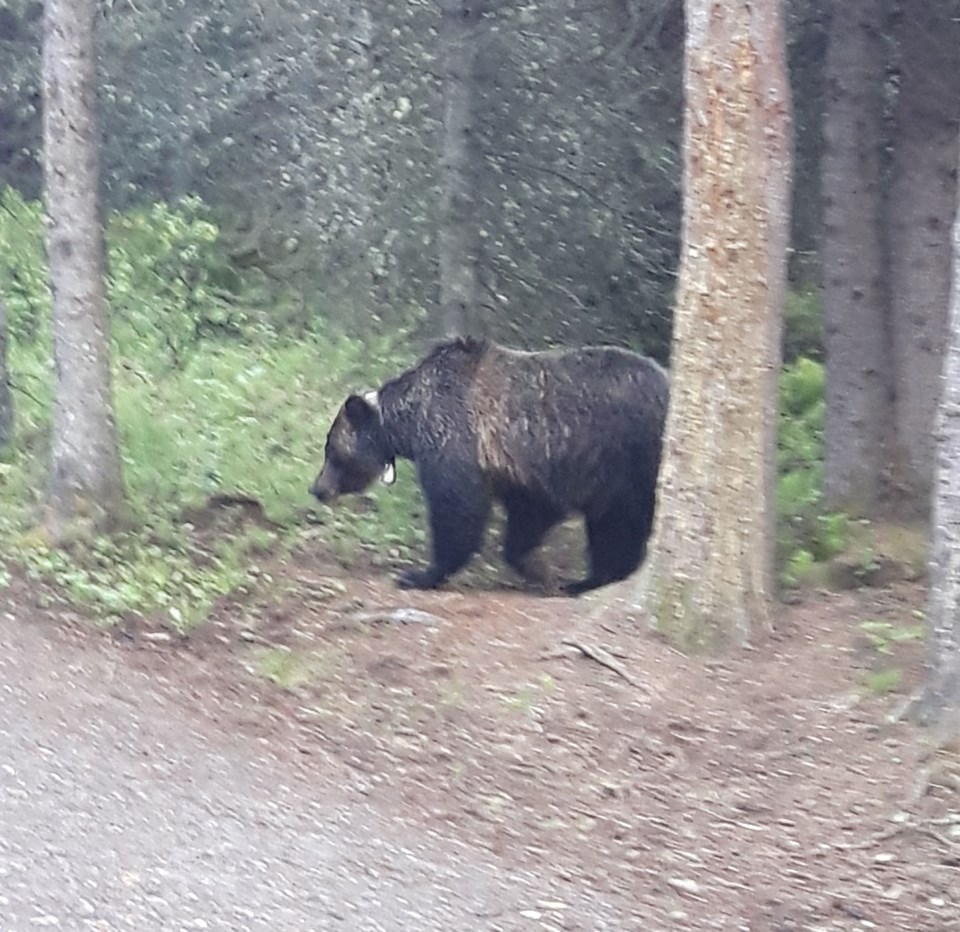Standing at the back of his camper one morning in mid June at a campsite in lower Kananaskis, Cochrane's Gordon Larin's mind raced through everything he knew about bears.
He had just woken up and had left his bear spray inside, not imagining he would suddenly find himself within metres of an adult grizzly bear.
"All I saw was this big, hairy butt," Larin said. "He (the grizzly) kind of looked up and looked back at me. He was calm, he didn't react."
Larin guessed he was about 10 steps away from his camper door.
"They're pretty fast. In the split second you're thinking, 'Can I make it back to the camper?'" he said.
"I kind of tippytoed back. The bear made no effort to come towards me so I just kind of quietly went back into the camper and told my wife."
The grizzly stayed in the area for about 20 minutes grazing on berries before leaving.
Human-wildlife expert Jay Honeyman said Larin did the right thing to prevent a bear attack.
Honeyman explained despite lessons of making loud noises and other efforts to scare a bear away, if a bear is calm the best thing to do is remain calm, while backing away.
"The bear sees you, you see them, and you quietly increase your distance and don't be threatening to the bear, and usually that's the end of it. Ninety-nine times out of 100, the issue comes about when people surprise bears," Honeyman said.
 "If you surprise them, then they get threatened by your presence and that's when they either run away or get nervous and want to remove the threat, if you will, that's when problems can occur."
Larin said he and his wife were aware of recent bear sightings in the area and considered the possibility of running into one when they arrived.
"My first clue was when we pulled into the campsite – pretty much every tree had claw marks on it," Larin said. "We knew we were close, so we were quite vigilant about (it)."
The couple said they had even foregone hiking the day before and had been out kayaking instead.
"The safest place from bears is the middle of the lake, really. We had thought of going on some hikes and we thought, 'You know what, let's err on the side of caution and not bother with that.'"
While Larin made it safely back into his trailer, Honeyman said the experience should serve as a cautionary tale to those camping despite warnings of bears in the area.
"It should be assumed that if you're in public lands – you know the foothills and mountains to the west – that you're basically in bear country," Honeyman said. "Whether you see a notice or not, the forested area to the west country is all bear country and bears are out this time of year."
Honeyman advised campers to be vigilant, keep food stored inside, dispose of trash in bear-proof bins and keep dogs on leashes.
"We're certainly advocating that people carry bear spray whenever they're out walking around, and to be making a bit of noise," he added.
If you do spot a bear near a campsite or hiking trail, Honeyman said to contact the poachers line at 1-800-642-3800 or call Kananaskis Emergency Services at 403-591-7755.
"If you surprise them, then they get threatened by your presence and that's when they either run away or get nervous and want to remove the threat, if you will, that's when problems can occur."
Larin said he and his wife were aware of recent bear sightings in the area and considered the possibility of running into one when they arrived.
"My first clue was when we pulled into the campsite – pretty much every tree had claw marks on it," Larin said. "We knew we were close, so we were quite vigilant about (it)."
The couple said they had even foregone hiking the day before and had been out kayaking instead.
"The safest place from bears is the middle of the lake, really. We had thought of going on some hikes and we thought, 'You know what, let's err on the side of caution and not bother with that.'"
While Larin made it safely back into his trailer, Honeyman said the experience should serve as a cautionary tale to those camping despite warnings of bears in the area.
"It should be assumed that if you're in public lands – you know the foothills and mountains to the west – that you're basically in bear country," Honeyman said. "Whether you see a notice or not, the forested area to the west country is all bear country and bears are out this time of year."
Honeyman advised campers to be vigilant, keep food stored inside, dispose of trash in bear-proof bins and keep dogs on leashes.
"We're certainly advocating that people carry bear spray whenever they're out walking around, and to be making a bit of noise," he added.
If you do spot a bear near a campsite or hiking trail, Honeyman said to contact the poachers line at 1-800-642-3800 or call Kananaskis Emergency Services at 403-591-7755.



